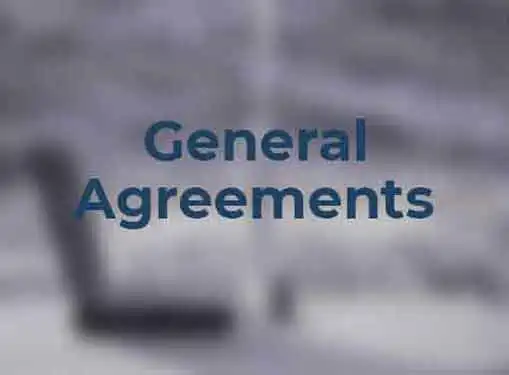Legal Information for Entrepreneurs
General Agreement
There are a slew of business scenarios that call for a general agreement. The next time you need a business agreement, you'll be prepared with our small business tips for executing a general agreement.
Your company makes agreements everyday.

Every sale, vendor contract or new hire is essentially a business agreement. Some business agreements have more significant consequences than others and necessitate the creation of a formal, written document. Although you've used written agreements before, the big question is whether your company is capable of producing written agreements that are legally enforceable.
At its most basic level, an agreement is an arrangement in which two or more parties commit to certain obligations and responsibilities. In theory, each party is legally bound to fulfill their part of the bargain. The more specifics you include in the agreement, the easier it will be to enforce the agreement in court.
A general agreement template can serve as the basis for nearly any agreement or contract your company requires. The idea isn't to limit the amount of information your individual agreements contain, but to make sure every agreement you execute covers all the bases. Here are several general agreement tips you'll want to incorporate into all of your company's written agreements.
- Identify parties. Agreements usually begin with an identification of the parties involved in the contract or business arrangement. Since the document will have legal consequences, parties should be identified by their legal name, address and other identifying features.
- Specify terms. Written agreements should document the terms of the deal in excruciating detail. Anything that is agreed upon verbally but not included in the written agreement is on shaky legal footing. It's possible to amend the agreement later - but only if the other party agrees with the suggested amendment.
- Clarify obligations. Always go out of your way to describe the exact nature of payments and other obligations. Deadlines, payment methods, delivery dates - it's all relevant to the proper execution of the transaction and needs to be included in the written agreement.
- Discuss consequences. Failure to comply with the terms and obligations of the agreement will have consequences. But consequences and penalties need to be articulated in the agreement itself in order to be enforced. Consequences can include nullification of the agreement, financial penalties or both.
- Address resolution process. Most agreements include some provision for dispute resolution. Your general agreement template should contain boilerplate dispute resolution language that can be copied into specific agreements on an as-needed basis.
Share this article
Additional Resources for Entrepreneurs



Conversation Board
We greatly appreciate any advice you can provide on this topic. Please contribute your insights on this topic so others can benefit.